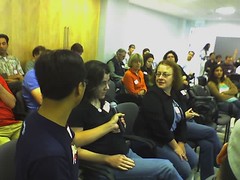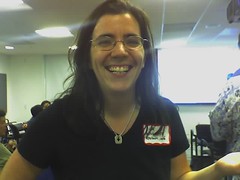Niall leading the discussion of standards for users – someone is saying “put rss standards up on the screen and let’s spend 5 minutes understanding it, most people in this room could.” “why should I? what is the value to me …” “do you use a cell phone? do you know what its protocols and standards are? no, who cares” “well i would if you said i could understand it in 5 minutes.” “we’re spending 15 minutes debating whether to spend 5 minutes.”
heh.
Where is our fabulous projected transcript? I don’t know who’s talking anymore.
By the way, there is a fabulous cappucino machine in the kitchen in the magma room or whatever it is called. it has peet’s coffee and grinds it and makes you a free mochachino. Right on. The cookies are gross and stale – alas. I should make some good cookies to bring tomorrow and go all den mother on their asses.
Niall has got something up ont he scrren… there is an argument going on… i can’t read the text, it’s too small. I have no idea what they’re talking about… XML… something… Chris ?? is saying she felt freaked out when x happened… dave winer says “now this is a problem… why say you freaked out… do you feel freaked out about other things in your life too?” what the fuck? what the fuckity fuck? Did I just miss something? That was really annoying from my POV, whatever it was. (Muttering from several women in my earshot, making sarcastic comments about dave’s personal “frustration in his life”…)
Niall finally makes Dave W. shut up and takes the discussion back.
Niall talks about RSS. parsing an xml rss file’s markup. okay… you know what, i can understand a markup language… without anyone pointing to it on a big screen. No one has actually explained why I want to know jack about rss markup.
*saving, to be continued in a minute*
come to think of it why not have a “liveblogging” mode for blogger/typepad/whatever, where you autosave LIVE every couple of minutes to the same file instead of my publishing the post, then going back tediously to edit it & make updates in the same post!!! liveblogging mode! did anyone hear that?
***
I’m muttering about why do I want to konw this? a dude turns around and says just roll with it and we’ll know why we want to know about it after we know it. Okay! haha!
Niall is going through more of the markup and the rss feed. guid, docs, generator, managingEditor, various other slots of information that it’s good to have filled in and that in theory you can change or update (globally across a site? or what? ) later. Niall invites Ponzi to talk as she just gave him a “what the” look.
ponzi: a ffew times you’ve said we don’t want to go into that… oh.. never mind… let’s not go into that right now…
niall: okay i won’t dumb it down. going into category? it doesn’t make sense in the form that doc searls has it right now…
doc: well actually..
someone: it’s totlaly esoteric… sometimes stuff is so convoluted… i did not do it this way to confuse you but b/c there was no other way to do it. i would swear in court on a stack of holy bibles you dont’ need to understand this. since i’m the guy to design all this i can say you can eat me.
ponzi? but since you just said that we need to understand it
*laughter… “hear hear”…
what? I’m missing like 90 % of the meaning of this… that’s okay… it’s clearly an rss ongoing conversation… v. intense…
some dude: blah blah i dont have to know whats under the hood of my car
some other dude: can i ask what you do for a living?
Jesus! Dick war city! Weenie war! Here is where my impulse is to get up and get some more coffee…
Niall: this is getting far away from our purpose. *applause*
some dude just took my picture and I mugged for it….
*****
this is not the standard this is a kluge and a hack…
that’s the point.. we have standards but what happens to the storage containers… what do people do with it.
what do we want for standards?
what are some of the things that could make your life easier? online?
– allowing things to be exported out of things to give peole a hope of interchange
– categories not implemented properly… standards are open to interpretation.
– things evolve and change, standards have to change….
– editors of icalendar etc talking… never got it right… calendaring standards that work… users and developers come at issues with their specific needs… they arre inherently in conflict. different perceptions of reality. you solve one and break another. calendars and schedules are different.
***
space out for a bit… reading email… ergh… must lie down…
***
Talking about feeds getting your programs and devices to talk to each other, getting info across. Yes… that would be lovely. just being able to ssee your bookmarks info in text format, or your addressbook. (YEAH!)
Car metaphor for the millionth time. The car metaphor is not very productive and i find it annoyingly anti-intellectual. “you don’t need to know how your car works” “we don’t ahve to know how your car works.” “we just want to get in the car and drive” erm, okay whatever. However, we want to be able to take our carseats out of the car and install them into another car without breaking a sweat or reading a user manual. That is the point of standards! duh!
identity standards. users taking matters into their own hands. (I want to hear more about that!)
guy saying that he wants printers to be more standards, should be able to print wherever to whatever. also, whatever pdf was supposed to do, it’s not doing it.
RSS and aggregators gave birth to the entire echo system a lot of people made money off of that. everyone’s free to exploit the lack of copyright. more standards means we make more money. (who was that? was that marc canter? i cant see… sounded like him…)
my name’s scott and i’ve been trying to share calendars with my wife for many years… *laughter*
“i want my software to quit tryihng to phone home….”
this is an extension of the user bitch session!
******
putting stuff on flickr… getting it out again.
marc canter just said something v. hysterical. you suck you spit, what goes in goes out… standards and api should go both ways. (yeah!!!)
eric and moblogging and textamerica horror story. tacit agreement, i’m giving you my content to keep, i hope you’re keeping it for me… then you find out they’re not.
It has been interesting to see Marc Canter in his natural habitat rather than at WoolfCamp.
***
we move on to talk about moving blogs. getting yoru data out.
elisa camahort says: how about an app that will crawl all my blogs every night and back them all up and keep them organized.!
YEEAH!!!!!! hear hear! I could use that! I’d pay for software to do that. I’m massively multiblogular, like Elisa is.
the inbound link to your data breaks… ! good point.

